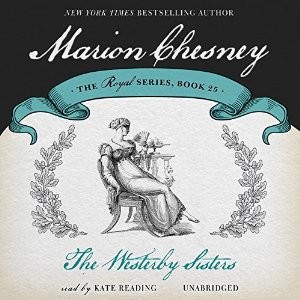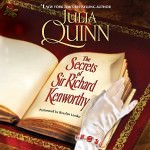 Narrated by Kate Reading
Narrated by Kate Reading
Set in the late Georgian era, The Westerby Sisters is the sequel to The Westerby Inheritance. While there are references to the earlier story and the characters are related, it’s not necessary to have read or listened to The Westerby Inheritance before this, as the background is very clearly explained in the first chapter. The sisters in question are Hester and Betty Lovelace, who, although they are incredibly wealthy, are looked down upon by society because they are the daughters of a blacksmith whose mother married above her station when she took the Marquess of Westerby as her second husband. The ladies live contentedly at Eppington Chase with their six-year-old nephew Simon, the current marquess, and at the beginning of the book have decided to go to London for the Season.
Betty is reluctant to go; she loves her home and has no desire to find a husband, but Hester’s enthusiasm and her insistence that Simon will love all the amusements London has to offer a young boy immediately signals that she has made up her mind – and Betty has never been able to change her sister’s mind about anything.
Betty is very shy and escapes from the crush of parties and balls as quickly as she can, preferring to hide somewhere out of the way until such time as she can go home. Her stunning beauty – and her massive fortune – means she does not lack for suitors, but she is not interested in any of them, having a vague idea of finding a man as retiring as she is who will come to love Eppington Chase as much as she does. When the handsome, haughty Duke of Collingham asks her to dance, Betty is startled and refuses him – and he walks off, thoroughly annoyed at the thought that the young woman had no idea of the honour being done her. But then, he reasons, what can one expect from a mere blacksmith’s daughter? Still, he can’t put her lovely face out of his mind, and at their next meeting, they strike up a conversation during which Collingham discovers Betty to be an engaging and quick-witted companion. Betty is similarly attracted to the duke, although she finds herself somewhat unnerved by the feelings he evokes in her.
The romance between Betty and Collingham is one of those that seems to take two steps forward and one step back. Possessed of his title from a very young age, Collingham is well aware of the deference due to his exalted position, so his fascination with a blacksmith’s daughter is both unexpected and annoying. Each time he and Betty seem to be coming to a closer understanding of each other, something happens to wreck it, often the fact that, in spite of his polished manners, he has an unerring ability to put his foot in his mouth. Collingham reminds me a little of Darcy in some respects; he’s most definitely proud, yet whatever he thinks – or tries to think – about Betty, he can’t forget her, and is her staunchest ally, prepared come to her aid whenever she needs it.
There is a secondary romance for Hester, and a plotline concerning a threat to Simon’s life which continues the story begun in the previous book. The resolution is simple but well put-together, although the identity of the villain is obvious from the outset. The thing that elevates this story to the slightly above average is the author’s attention to historical detail in the descriptions of the dress, settings and customs of the day, the glimpse into the marriage of an ill-suited couple, and in the humour displayed in a number of scenes featuring the secondary characters. As an example, the unhappily married Sir Anthony and the equally unhappy Fanny Bentley are drawn together through their mutual love of food. Both have been ruthlessly subjected to slimming diets – Sir Anthony by his wife and Fanny by her mother – and find they are kindred spirits when it comes to the dinner table. Kate Reading makes the most of their scenes together, playing for laughs it’s true, but doing brilliantly nonetheless, going into orgasmic raptures during discussions about truffles, roast beef and frumenty. The later scene with the sausage and the peaches is a hoot. ;-) And then there are those moments when Collingham and Betty decide it’s time to throw caution to the winds and lock lips – but are interrupted by the sounds of others getting it on, which is perhaps a little cheeky for an historical first published in 1983!
I enjoyed the story more than I had expected to (most of the reviews on Amazon are fairly negative, principally due to issues relating to the previous book!), and Kate Reading is once again on top form, her unerring ability to locate the irony and humour in any given story making me laugh out loud on several occasions. The two sisters are very clearly delineated so that there is never any danger of mixing them up. Hester has a slightly stronger accent and forceful tone that accurately reflects her more forceful personality, while Betty’s voice is higher pitched with a slightly dreamy air sometimes that works well to indicate her youth and inexperience. Collingham sounds exactly as he is supposed to – extremely masculine and somewhat awe-inspiring, and Mrs Bentley has an unpleasant nasal twang that leaves the listener in no doubt of her spiteful, grasping nature. All the other secondary characters are portrayed very well, from the bluff Sir Anthony and Hester’s beau, Captain Dunbray, to young Simon and the various servants and lackeys who crop up throughout. Ms Reading delivers the narrative smoothly and at a good pace and, as in the dialogue, is scalpel sharp when it comes to picking up on the author’s ironic asides and her subtle pokes at some of society’s more ridiculous mores (!).
The Westerby Sisters is a fairly short audiobook, at around seven and a half hours, and I listened to it all in one day as I pottered around. I suspect Ms Reading’s performance contributed to my enjoyment in no small way, but even though some aspects of the storytelling are a little uneven, I found it both amusing and engaging, and would certainly recommend it to anyone looking for a light-hearted historical to listen to.
Note: Marion Chesney, aka M.C Beaton and a number of other aliases is an incredibly prolific writer of historical romances and mysteries (the Agatha Raisin and Hamish MacBeth books number among the latter), and many of the romances are being republished under the Beaton name. When it comes to the audiobooks, however, it’s confusing, because some are published as Beaton and some as Chesney, and Audible mixes them up, so it’s common to find a title listed as M.C Beaton that has Marion Chesney on the cover. Basically, if you’re a fan of hers, you’ll have to look under both names to get a complete listing of available audiobooks.
Caz
Narration: A
Book Content: B-
Steam Factor: Glad I had my earbuds in (but at the very tame end)
Violence: None
Genre: Historical Romance
Publisher: Blackstone Audio
The Westerby Sisters was provided to AudioGals by Blackstone Audio for a review.
[jwl-utmce-widget id=32435]





2 thoughts on “The Westerby Sisters by Marion Chesney”
Comments are closed.